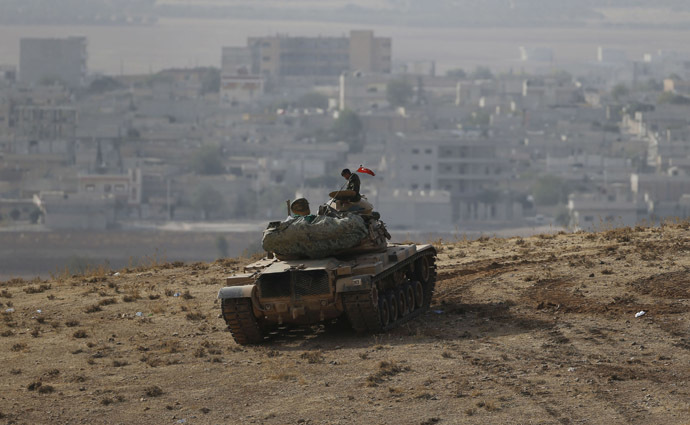Awaiting Carnage
"You remember Srebrenica? We do. We never forgot. And probably we never forgave ourselves for that."
UN Syria envoy Staffan de Mistura, Geneva
"It used to be good in Ramadi, but no more. It is so dangerous, we couldn't even go back there if we wanted to. There are bombs exploding all the time. But airstrikes will never end this war. There have to be ground forces to cut their logistics. This is going to take a long time."
Iraqi, fearing to divulge his name
"Baghdad is almost entirely cut off in every direction and Mosul is controlled by Daesh (ISIL), so it is impossible to go to either place anymore."
"The bombing helps, but 100 percent I tell you, there has not been enough bombs because Daesh (Islamic State) are not good people and they are still winning. Nobody knows what to expect next. It is a mystery to us."
Yal Maz Hussein, Gali Ali Beg, Iraq
Smoke rises after an
U.S.-led air strike in the Syrian town of Kobani Ocotber 9, 2014.
Credit: Reuters/Umit Bektas
On the other hand, any who remained behind were gathered together, encouraged to dig a trench large enough to accommodate the task at hand in a time-honoured tradition of fascists, engaged by the Nazis and now by the Islamofascists, to mass murder their opponents and simply get them out of contention, honourable wartime conventions be of their own. But in Iraq, the regime also doesn't task its military to attack its own people.
So it's a tossup, whether it's more humane for the Iraqi regime to abandon their civilian populations to their fate, suffering under the ISIL/ISIS/Islamic State advance and domination, or for the Syrian government itself to dispatch its troops to slaughter its own, dissentingly rebellious Sunni populations. No one in Syria is exempt from attacks by the regime military, unless they are Shia Syrians. Syrian children have been on the receiving end of chemical and barrel bomb attacks.
And now twin bombings hard by an elementary school killed children outside the Ekremah Al-Makhzoumi school in a government-controlled area of Homs where minority Alawites dominate loyal to President Bashar al-Assad. Two vehicles; the first exploding as children left school for the day, the second striking as horror-struck adults carried away the bodies of wounded and dead children.
Social media networks featured images showing women's heads placed on a cement block in Jarablous, the ISIS-held northern Syrian city. The women, Kurdish fighters, were taken prisoner in Kobani. The YPG, the chief Kurdish group now fighting in Syria, advocates gender equality and so women fight bravely alongside men in defence of their values, their geography and homeland, their lives. Where else in the world would a brutal militia decapitate women and celebrate the vision?
The fighting in Kobani has been responsible for one of the largest migrations in Syria's civil war, with over 160,000 people seeking haven in Turkey, according to UN humanitarian chief Valerie Amos. Turkey busies itself registering the refugees in refugee camps, even as it stands idly by with military indifference as the city of the refugees is slowly reduced to rubble, its defenders forced out little by little, leaving the Islamic State forces now in command of 40% of the city.

Labels: Conflict, Iraq, Islamic State, Islamofascism, Kurds, Syria

<< Home